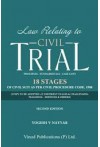- Author(s): Yogesh V Nayyar
- Publisher: Vinod Publications (P) Ltd.
- Edition: 2 Ed 2025
- ISBN 13 9789395939690
- Approx. Pages 1848 + Contents
- Format Hardbound
- Approx. Product Size 24 x 18 cms
- Delivery Time 3-5 working days (within Kerala & South India) (Others 7-9 days)
- Shipping Charge Extra (see Shopping Cart)
......................................................................................................................................
Description
Law has its own spirit and sanctity! Where we speak of litigation be civil or criminal, it becomes important that every step under law which leads to justice need to be carried out
in a systematic manner.
For the cause and for delivering justice to litigants approaching the Court of Law, Civil Procedure Code was enacted which went through numerous amendments looking to the need of litigants, and Courts; for proper and fair delivery of justice without being biased.
The word limitation in its literal term means a restriction or the rule or circumstances which are limited. The law of limitation has been prescribed as the time limit which is given for different suits & proceedings to the aggrieved person within which they can approach the court for redress or justice. The basic concept of limitation is relating to fixing or prescribing of the time period for barring legal actions. According to Section 2 (j) of the Limitation Act, 1963, 'period of limitation' means the period of limitation prescribed for any suit, appeal or application by the Schedule, and 'prescribed period' means the period of limitation computed in accordance with the provisions of this Act.
The main object to limit any legal action is to give effect to the maxim 'interest reipublicaeut sit finis litium', which means that in the interest of the State is required that there should be a limit to litigation and also to prevent any kind of disturbance or deprivation of what may have been acquired in equity and justice or by way of long enjoyment or what may have been lost by a party's own inaction, negligence or leaches (acquiescence).
Looking to the aspect; where hundreds of young enthusiasts' enter into the field of Law as professionals making their entry and appearance before the Courts; it's imperative for every Lawyer, be young new entrant or experienced; to be well aware of the system; the procedures and the Law governing the Civil Litigation.
The basic 18 stages are truly fundamental which is imperative to have knowledge of; for every Lawyer for contesting a civil litigation and with prompt and speedy justice avoiding undue delay and complexities.
......................................................................................................................................
Table of Contents
Chapter 1. Brief Understanding to 18 Stages Under Code of the Civil Procedure, 1908
Chapter 2. Definitions under Code of Civil Procedure, 1908
Chapter 3. What is a Suite? Understanding Institution of Suit and Parties to Suit
Chapter 4. Jurisdiction - A Composite to Suit
Chapter 5. Importance of Notice and Necessity for Institution of Suits by and Against Government and Statutory Bodies
Chapter 6. Cause of Action
Chapter 7. Pleadings Generally
Chapter 8. Plaint and Components
Chapter 9. Issue and Service of Summons
Chapter 10. Return and Rejection of Plaint
Chapter 11. Appearance of Parties and Consequences of Non Appearances
Chapter 12. Written Statement Order Code of Civil Procedure
Chapter 13. Discovery, Inspection, Production, Admissibility and Proof of Documents
Chapter 14. Preliminary and Framing
Chapter 15. Judgment on Admission
Chapter 16. Production,Impounding and Return of Documents and Summery Judgments
Chapter 17. Disposal of the Suit at the First Hearing
Chapter 18. Summoning and Attendance of Witnesses Confined or Detained in Prisons
Chapter 19. Evidence and Affidavits Production - Proof - Appreciation of Evidence
Chapter 20. Judgment and Decree
Chapter 21. Striking out or Addition of Parties
Chapter 22. Execution Proceedings
Chapter 23. First Appeal and Second Appeal Under CPC
Chapter 24. Civil Revision
......................................................................................................................................
Author Details
Shri. Yogesh V Nayyar, born in 1969 at Dehradun, Uttarakhand continued his post studies and pursued Law from University College of Law, Nagpur University; in the year 1990-93 and stood in merit in Nagpur University.
A criminal investigative lawyer, with a science back ground and passion for study in criminal science, detection of crime; Yogesh V Nayyar started practicing as a Lawyer before Court in March, 1994.
Awards"
Awarded with International "Top 50 Legal Falcon, 2021 (Category - Legal)" Award at LexTalk World's Global Hybrid Conference on Law" held at Dubai on 07th and 08th April, 2021 among Lawyers from UK, Europe, Africa and Asia, an Literatture Award, 2021 by Nazmehayat for writing poems in Hindi.
Nominations/Appointments:
Nominated & appointed as Member, Advisory Committee, National Museum of Forensic Science in 2023. To nod@ufen
Nominated and appointed as "Member, International Council of Jurists", London, in February, 2020.
Nominated and appointed as "Ombudsman & Arbitrator", Federation of Integrated Conflict Management (FICM) and Arbitrator,
"Ombudsman & Arbitrator," International Commercial Disputes Tribunal, in 2017 and 2019.
Re appointed "Ombudsman & Arbitrator," International Commercial Disputes Tribunal, in 2022.
Author of Books:
A+W bas boite boda to slo
• Malicious Prosecution, Harassment, Brutality And Torture Of "Accused - A Victim" Relief's & Remedy.
Encyclopedia on Medico-Legal Cases, Forensics & Criminal Law. " • Hand Book on Special & Allied Laws (Criminal) Etc.

